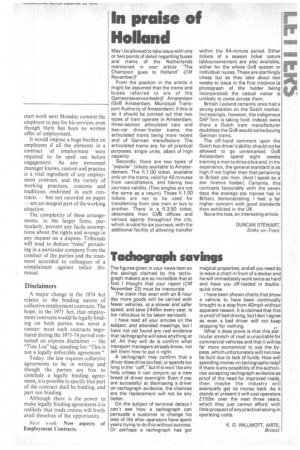Tachograph savings
Page 39

If you've noticed an error in this article please click here to report it so we can fix it.
The figures given in your news item on the savings claimed by the tachograph makers are so incredible that at first I thought that your report (CM November 22) must be inaccurate.
The claim that even with an 8-hour day more goods will be carried with fewer vehicles, at a slower and safer speed, and save f445m every year, is too ridiculous to be taken seriously.
I have read all your articles on the subject, and attended meetings, but I have not yet found any real evidence that tachographs will save anything at all. All they will do is confirm what transport managers already know, not tell them how to put it right.
A tachograph may confirm that a driver does drive too fast, or spends too long in the "caff," but this won't be any help unless it can conjure up a new breed of driver overnight. Even if you are successful at dismissing a driver on tachograph evidence, the chances are the replacement will not be any better.
On the subject of terminal delays I can't see how a tachograph can persuade a customer to change his way of life after operators have spent years trying to do this without success. Or perhaps a tachograph has got magical properties, and all you need do is wave a chart in front of a docker and he will immediately work twice as hard and have you off-loaded in doublequick time.
I have been shown charts that show a vehicle to have been continually brought to a stop from 40mph without apparent reason. It is claimed that this is proof of bad driving, but I don't agree as even a bad driver will not keep stopping for nothing. :– What it does prove is that this particular stretch of road is unsuitable for commercial vehicles and that it will be far more economical to use the bypass, which unfortunately will not now be built due to lack of funds. How will spending money on tachographs help? If there is any possibility of the authorities accepting tachograph evidence as proof of the need for improved roads, then maybe the industry will eventually get its money back. As it stands at present it will cost operators f150m over the next three years, which they just cannot afford, with little prospect of any practical saving in operating costs.
K. 0. WILLMOTT, AIRTE, Bristol.




















































































